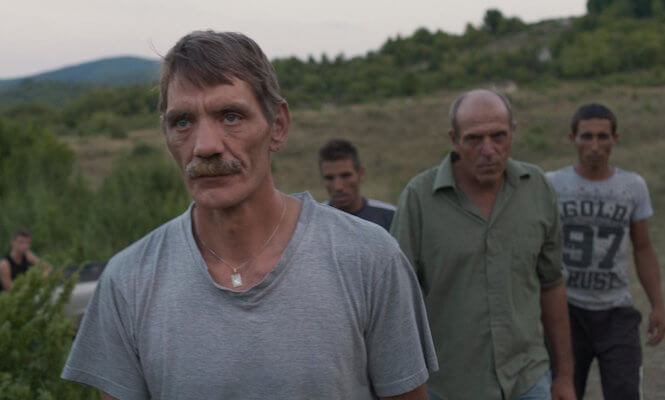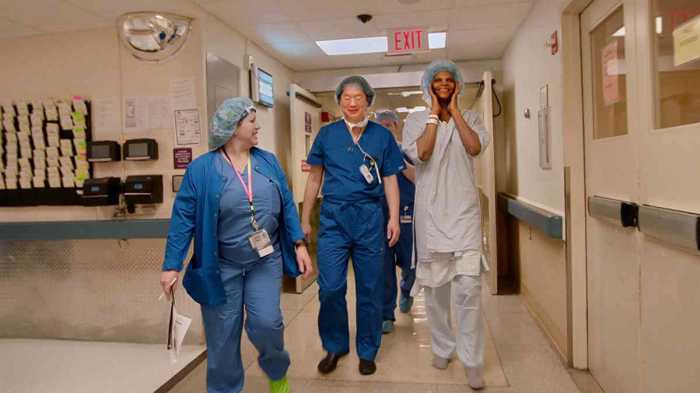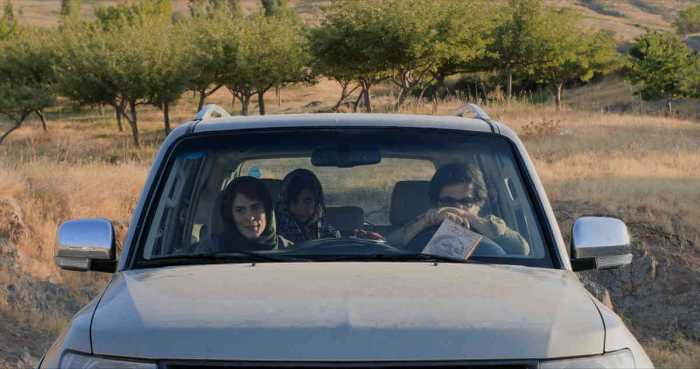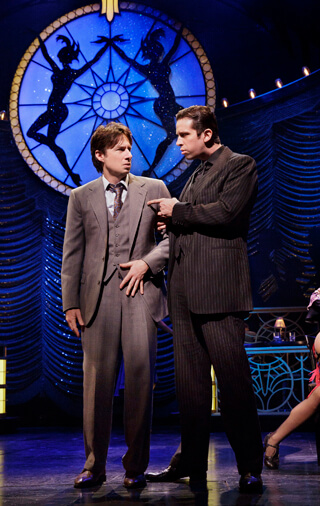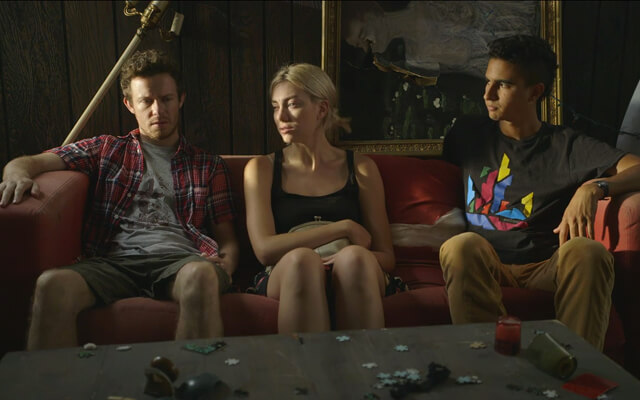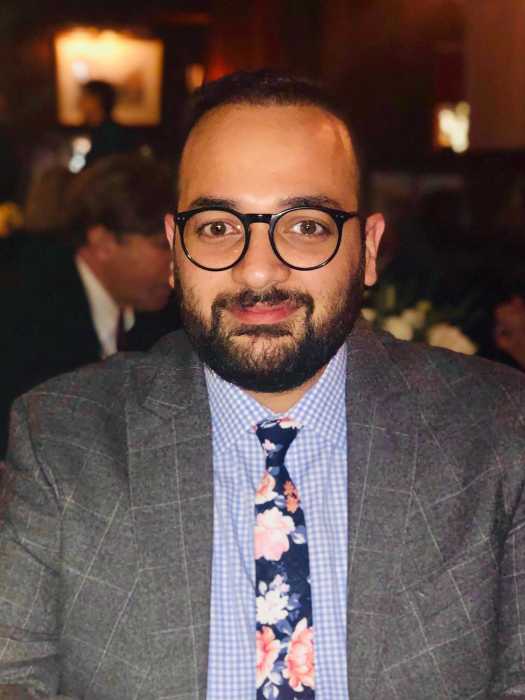Eili Harboe in Joachim Trier’s lesbian horror film “Thelma.” | THE ORCHARD
There’s something new about the 55th edition of the New York Film Festival that may not be apparent at first glance. There’s basically no participation from conventional Hollywood studios. The festival has not given up on showing mainstream cinema, such as the opening night film (Richard Linklater’s “Last Flag Flying”; Sep. 28, 6 & 6:15 p.m.) and the closing night film (Woody Allen’s “Wonder Wheel”; Oct. 14, 6 & 6:15 p.m.). But both films are produced by Amazon Studios, as is the festival centerpiece by out gay director Todd Haynes, “Wonderstruck” (Oct. 7, 6 & 6:15 p.m.).
Thirty years ago, those films would have been made by a Hollywood studio, while 15 years ago Miramax or Fox Searchlight probably would have distributed them. Netflix also has two films in the festival’s Main Slate, including out lesbian director Dee Rees’ “Mudbound” (Oct. 12, 6 p.m.; Oct. 13, 9:15 p.m.) and several in the documentary sidebar. A24, the one indie distributor to emerge in the past five years that has proven itself capable of competing with Hollywood (it released “Moonlight” and managed to win the Best Picture Oscar with it), has two films in the festival: Greta Gerwig’s “Lady Bird” (Oct. 8, 6 p.m.; Oct. 9, 9:30 p.m.) and Sean Baker’s excellent “The Florida Project” (Oct. 1, 3 p.m.; Oct. 3, 6 p.m.).
New York Film Festival demonstrates how diverse content creation has become
There are several films of LGBTQ interest this year, especially out gay director’s Luca Guadagnino’s “Call Me by Your Name” (Oct. 3, 9 p.m., Oct. 4, 6 p.m.), which the Village Voice has already called a breakthrough in gay cinema and James Woods made a fool of himself by linking to NAMBLA (it was not available as of Gay City News’ deadline for review screening), Joachim Trier’s lesbian horror film “Thelma,” and Robin Campillo’s ACT UP epic “BPM (Beats Per Minute).” As always, I’d urge festivalgoers not to ignore the documentary and avant-garde sidebars, as well as the revivals of older films in new restorations.
“Thelma” (Oct. 6, 9 p.m.; Oct. 7, noon) borrows heavily from “Carrie” and Darren Aronofsky’s “Black Swan,” and while it’s better than the latter film, its tale of an 18-year-old lesbian struggling to find herself amidst an oppressively religious family, problems with epilepsy, and difficulties distinguishing fantasy from reality that pull Trier’s film into genre territory suffers from poor pacing, a bloated running time, and too many “is this real?” carpet-pulling games.
Claes Bang in Swedish director Ruben Östlund’s “The Square,” which begins as a satire on the art world, but goes much further than that. | MAGNOLIA PICTURES
Swedish director Ruben Östlund’s films combine a general pissiness with a sense of humor and a desire to entertain. His latest, “The Square” (Sep. 29, 8:30 p.m.; Oct. 1, 9 p.m.), took the top prize at Cannes last spring, and his fortune as a director has been rising since his previous film, “Force Majeure,” became a minor hit at American arthouses and the Film Society of Lincoln Center followed it up with a retrospective of his earlier work, including the excellent “Involuntary.” Östlund has a desire to provoke that he probably inherited from Michael Haneke and Lars von Trier, but with the exception of von Trier’s “The Idiots” and “The Boss of It All,” the directors who’ve influenced him don’t make comedies.
“The Square” begins as a satire on the art world: a museum director’s pride in a new installation, from which the film gets its title, goes awry when a staged promo video of a young homeless girl exploding near it goes viral and gets misinterpreted. It’s easy to mock artists like Jeff Koons and Damien Hirst, and, fortunately, this isn’t Ostlund’s real agenda. He’s far more interested in the way power and wealth function in urban life; unlike almost every other film set in big cities in the West, “The Square” is true to the amount of homelessness contained there and the extremes of class conflict that result from the rich and poor constantly bumping against each other. Running two and a half hours, it’s Östlund’s most ambitious film.
Nahuel Pérez Biscayart in Robin Campillo’s ACT UP feature “BPM (Beats Per Minute).” | CEÌLINE NIESZAWER/ THE ORCHARD
Out gay French director Robin Campillo’s “BPM (Beats Per Minute)” (Oct. 8, 8:30 p.m.; Oct. 9, 6 p.m.) is the ACT UP saga I never expected to see. Set a few years before protease inhibitors hit the market and changed HIV treatment forever, it tells a love story between HIV-positive activist Sean (Nahuel Pérez Biscayart) and his fellow ACT UP member Nathan (Arnaud Valois), as Sean gradually grows sicker. But the first half of the film is a celebration of ACT UP’s actions, told on a much larger and slicker canvas than ever before in narrative cinema. In fact, this is the kind of movie where Sean and Nathan’s relationship sometimes feels like a distraction from the more interesting political work they’re involved in.
Campillo’s lack of prudishness is distinctly un-American: one scene starts with the beginnings of sex, turns into a discussion of how Sean became HIV-positive, and eventually turns back into an explicit sex scene. The finale crosscuts among sex, dancing, and a protest: pretty much every base is covered.
Campillo was an ACT UP member himself in Paris in the early ‘90s, and his memories of the period seem accurate. The full French title translates as “120 beats per minute,” and the film is full of ‘90s house music, as well as an ecstatic scene set to the Bronski Beat’s ‘80s gay synth-pop classic “Smalltown Boy.” The only film I can really compare “BPM (Beats Per Minute)” to is David France’s documentary “How to Survive a Plague,” but by working in fiction Campillo is able to indulge melodramatic effects that France was unable to use. This is both a call to protest and a tragedy, although it’s fairly conventional in form.
Valeska Grishebach’s “Western” considers frontiers in a 21st century context. | CINEMA GUILD
German director Valeska Grisebach’s “Western” (Sep. 30, 3 p.m.; Oct. 1, 8:30 p.m.), her first film in 11 years, is a deceptively casual film. Its sun-dappled cinematography, shot in the summer in rural Bulgaria, is beautiful in an unobtrusive way. The last German film to make an impact in America, Maren Ade’s “Toni Erdmann,” dealt with the interactions of well-to-do Germans and poorer Romanians, although it was far more concerned with father-daughter relations. “Western” takes that semi-colonial relationship between Western and Eastern Europe as its entire subject matter. However, the German characters are working-class men, and the sense of Bulgaria as a new frontier after communism is implied by Grishebach’s very title. This is obviously a film by a woman largely about men, and critic Michael Sicinski, on Twitter, compared it to Claire Denis’ classic “Beau Travail,” adding “but prose, not poetry.” It’s true that there are no obvious peak moments, such as Denis Lavant’s inept but incredibly expressive dancing at the end of “Beau Travail,” but “Western” goes deep in a way that’s not immediately apparent, lifting imagery such as horses from its titular genre.
55TH NEW YORK FILM FESTIVAL | Sep. 28-Oct. 15 | Various Lincoln Center venues | filmlinc.org/nyff2017

